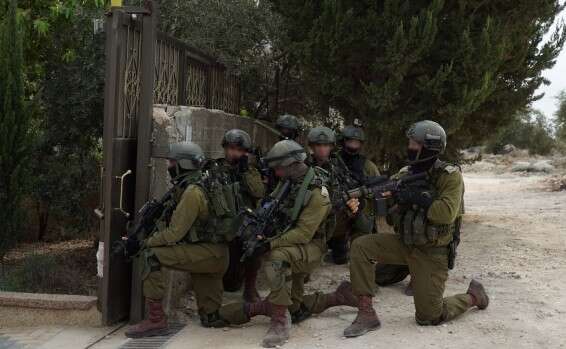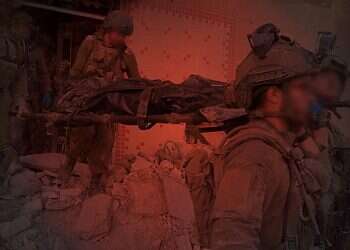At the end of the month, when Military Intelligence presents its projections for 2019, it is expected to focus on two sectors: the Gaza Strip and the Syrian and Lebanese borders, where Iran is trying to tighten its grip. Little attention will be paid to Judea and Samaria, which as things stand is poised to end 2018 as Israel's bloodiest sector.
There is no dispute that the potential for a security escalation is far more complex on Israel's southern and northern borders, but the West Bank poses a daily challenge for Israel, as this week has shown.
For the most part, what goes on "over there" remains largely out of the public's collective mind, as does the considerable effort Israel invests in counterterrorism and is ensuring some sort of normal routine in an area where the lives of millions of Palestinians and hundreds of thousands of Israelis intertwine on a daily basis.
The IDF's counterterrorism efforts make headlines only when an attack takes place or when manhunts for the terrorists who carried them out prove successful. The daily grind in between rarely gets a mention in the media and, barring an extreme human interest story, the chances of reality in the West Bank crossing the average Israeli's mind for more than a split second are slim. For Israelis who do not live in Judea and Samaria, it may as well be a different country.
That should not be the case, because Judea and Samaria are far more relevant to Israeli reality than Gaza or Lebanon. The area's economy is totally dependent on Israel while Israeli security largely depends on any unrest there, as turmoil in the West Bank spells terrorism and casualties in Israel.
This is a very delicate equation that many – especially Hamas – are trying to sabotage, and any success on their part would be disastrous for Israel's security.

Thirteen Israelis have been killed in terrorist attacks across Judea and Samaria since the beginning of the year, including two soldiers who were gunned down near the Givat Asaf outpost on Thursday. Still, overall, this is a slight decrease from 2017 and 2016, when 14 Israelis were killed there, and certainly from 2015, when the lone-wolf intifada claimed the lives of 25 Israelis.
To compare, no Israelis were killed in the northern sector in 2018, while two IDF officers were killed in the Gaza sector and one Palestinian civilian was killed in Ashkelon in November's clash between Israel and Hamas.
Every terrorist attack represents a failure on the part of security forces, but the data actually reflects their success, not only because of the decrease in the number of casualties but because of the increase in the number of terrorist attacks that the Shin Bet security agency, IDF and Israel Police have been able to thwart.
This effort is constantly tested by terrorist groups' motivation to carry out attacks, especially "quality" ones, defined as abductions, suicide bombings, planting explosives, stabbings, and ramming attacks. There have been 64 quality attacks in 2018, down from 96 in 2017, 183 in 2016 and 221 in 2015.
The number of "minor" terrorist attacks, which include stoning and firebomb incidents, has also declined over the past year, dropping to 750 from 957 in 2017, 989 in 2016 and 1,521 in 2015.
Hamas stirring unrest
Although most of the casualties in recent years have been the result of lone-wolf attacks, most of Israel's efforts are invested in thwarting terrorist cells, which can wreak considerable havoc. The emphasis, as always, is placed on Hamas, which invests tremendous energy in two corresponding axes: calming the unrest in Gaza and stirring unrest in the West Bank.
After a series of failures in carrying out mass terrorist attacks against Israelis, Hamas has recently made organizational changes to increase its operational efficiency in the West Bank. This means closer coordination between the Gaza headquarters, headed by senior Hamas military leader Yahya Sinwar, deputy Hamas political leader Saleh Arouri, who splits his time between Turkey and Lebanon, and operatives on the ground. Behind the scenes, there is also increased cooperation with the "northern axis" – Iran and Hezbollah – meaning not only more money but also the expectation of more significant successes later on.
The idea is not only to make Israel "pay" for the situation in Gaza but also to undermine Israelis' sense of security and rattle the Palestinian Authority, Hamas' archenemy.
Some cells are made up of Hamas operatives while others are independent ones, affiliated with Hamas in name only, to secure financial and logistical assistance. Israel's intensive counterterrorism efforts and the lack of local expertise limit these cells' success but the motivation is very much there, as seen by the 700 major attacks that were foiled since the beginning of the year and the 2,700 terror suspects the Shin Bet has arrested across the West Bank.
Lone-wolf terrorists are a different matter. Some are ideologically motivated and some are driven by personal distress, but for all of them, carrying out a terrorist attack, especially a successful one, is a springboard to turning from a "nobody" to a "somebody" – from someone who perceives themselves as worthless to someone revered by his family and Palestinian society.

Israel has noted impressive achievements opposite this group as well, mainly based on advanced technological capabilities that allow the defense establishment to detect potential terrorists before they realize their nefarious intentions. Here, however, there cannot be 100% success. Unlike terrorist cells, which inherently create chatter that can be tracked, most lone terrorists do not share their plans with their surroundings, and more often than not, they act on the spur of the moment.
The copycat phenomenon
Israeli soldiers stationed across Judea and Samaria are trained in detecting suspicious behavior and markers, but while an on-foot terrorist can be relatively easily neutralized, ramming attacks or drive-by shootings are a different thing altogether because a car will seem innocent until the moment it turns lethal.
This was the case in Sunday's drive-by shooting near Ofra. The terrorists' vehicle roused no suspicion until is stopped in front of a bust stopped and its passengers opened fire. Soldiers stationed nearby engaged immediately, making the terrorists flee rather than continuing on their killing spree, thus making a life and death difference for more than a few Israeli civilians.
On Wednesday, after a two-month manhunt, Israeli security forces finally eliminated Ashraf Walid Suleiman Naalwa, the terrorist who murdered two Israelis in an Oct. 7 shooting attack in the Barkan Industrial Park in Samaria.
Naalwa was able to stay under the IDF and Shin Bet's radar for just over eight weeks – record time in Palestinian terms. Salah Barghouti, who headed the terrorist cell that carried out the Ofra shooting, was not as lucky and was eliminated just a few hours earlier, after being on the run for three days.
The difficulty in eliminating the Barkan terrorist versus the quick cracking of the Ofra shooting can be traced primarily to the different dynamics of the two attacks – a lone wolf versus a cell, meaning an individual who barely generates intelligence opposite a group whose members' interaction creates opportunities to take action.
The fact that both terrorists were eliminated within hours of each other was coincidental, but it attests as to how deep the Shin Bet's intelligence assets on the ground run, as well as to the considerable effort invested in cultivating them. This is more than the desire to see justice served – the prime concern in both cases was that those who pulled the trigger once may be all too eager to do it again.
Another real concern is that the Barkan and Ofra shootings would inspire copycat attacks. Israel knows that the swift resolution of terrorist attacks and the foiling of others spell less motivation for future would-be terrorists.
The Shin Bet and the IDF are trying to conduct these activities with minimal disruption to the daily lives of the Palestinians in the West Bank. Lawmakers' calls for collective punishment against the Palestinian public are routinely dismissed by senior political and defense officials, who warn this could only achieve the opposite effect and agitate the situation on the ground.
Palestinians in the West Bank generally have little energy or motivation for violence. They are busy fighting social and economic fights against the Palestinian Authority or protesting major diplomatic issues, such as the United States' decision last December to relocate the American Embassy from Tel Aviv to Jerusalem.
This has been going on for several years now, and it is an issue which is both a blessing and a curse: As long as Israel makes sure to allow the Palestinians to go about their lives and earn a decent living, and as long as it refrains from provocative actions at the holy sites and succeeds in foiling attacks by extreme right-wing activists, the IDF will be able to focus on its counterterrorism operations without worrying about triggering a new intifada. On the other hand, the fact that the Palestinian public is clearly turning against the Palestinian Authority undermines its leadership and may create a vacuum that Hamas will rush to fill.
These trends are likely to worsen in 2019, fueled by more terrorist attacks orchestrated by Hamas or devised by independent cells and lone wolves, as well as by increasing Palestinian unrest in the West Bank over the economic situation, the lack of any diplomatic horizon and the growing preoccupation with the post-Abbas era, especially since Palestinian Authority President Mahmoud Abbas refuses to name a successor.
Israel will try to keep things under control without seeing the situation escalate into a new wave of terrorism, which also means keeping a large contingent of forces in Judea and Samaria, at the expense of Gaza and the northern borders.
This also means extensive counterterrorism efforts alongside extended collaboration with the Palestinian security forces – something that has to be pursued despite Abbas' overt hostility, if for no other reason than the fact that the alternative is much worse.
Worse still, a security escalation in the West Bank is liable to ignite Gaza and perhaps even other sectors. Gaza may be making more headlines, but history has proven that the West Bank remains an Archimedean point in the Middle Eastern chaos, which is why Israel must be vigilant and ensure that this volatile area does not experience an undesirable escalation.




